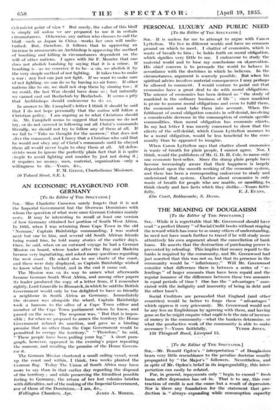PERSONAL LUXURY AND PUBLIC NEED [To the Editor of Tun
SPECTATOR.] Sin,—It is useless for me to attempt to argue with Canon. Lyttelton. We live in different worlds and have no common ground on which to meet. I chatter of economics, which is waste of breath to him ; he holds forth on moral obligation, which signifies very little to me. I endeavour to study the material world and to base my conclusions on okservation. His chief concern is to persuade the world to_ behave. in accordance with the doctrines in which he believes. In the circumstances, argument is scarcely possible. But when his spiritual advice involves .material consequences I may. perhaps , be allowed to comment. I would venture to point out that economics have a great deal to do witlh moral obligations. The science of economies has been defined as " the study of. mankind in the ordinary business of life " ; since mankind is prone to assume moral obligations and even to fulfil them,, the economist must take them into account. When the . fulfilment of moral obligation consists in self-denial,-involvieg a considerable decrease in the consumption of certain specific commodities, then moral obligation has economic effects. In my last letter I was merely concerned to show. that the effects of the self-denial, which Canon Lyttelton assumes to be a moral obligation, would be less beneficial to the com- munity than he appeared to imagine.
When Canon Lyttelton says that chatter about economies: is waste of breath for plain people, I cannot agree. Nor, I think, would the publishers of Mr. G. D. H. Cole, to name only, one economic best-seller. Since the slump plain people have become increasingly aware that their happiness is largely dependent upon the smooth working of the economic system., and there_ has been a corresponding endeavour to study and understand.: that system.. Chatter about economics is, only waste of breath for people who are ,unable, .or unwilling, to ,, think clearly and face facts which they dislike.—Yours faith-






































 Previous page
Previous page